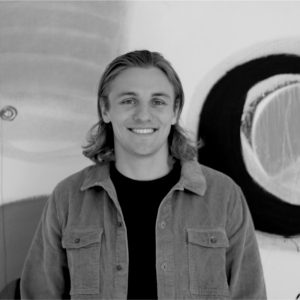As part of our series of blogs to celebrate UK Disability History Month, we caught up with Jamie – a 2019 graduate who also happens to have dyslexia and dyspraxia. Read on for Jamie’s thoughts on embracing difference at university and beyond…
My name is Jamie; I studied LSE’s MSc China in Comparative Perspective and graduated in 2019.  I am a proud dyslexic and dyspraxic. I am currently a strategic lead for the US consultancy Said Differently and am a Co-founder of the early-stage EdTech start-up Talamo Dyslexia Diagnosis.
I am a proud dyslexic and dyspraxic. I am currently a strategic lead for the US consultancy Said Differently and am a Co-founder of the early-stage EdTech start-up Talamo Dyslexia Diagnosis.
Tell us a bit about your career journey so far…
Since I left LSE, my career trajectory has been completely different from what I imagined. Before I studied at LSE, I spent a couple of years living and working in China. It was my dream to go back afterwards; however, I stumbled on an opportunity at the digital design agency AKQA. I spent about 20 months there learning the ropes to become a digital transformation/service design strategist – essentially creating best-in-class digital products for large companies. This experience was great as it forced me to focus on what customers wanted while thinking about the business impact for the company.
In hindsight, this job was perfect for me and my dyslexia. It allowed me to flex my problem-solving/creative abilities without being exposed to some of my shortcomings, such as working memory, spelling and grammar. Instead of moving back to China (this became more difficult due to the pandemic), I looked West to the US for a new opportunity. I am currently working for Said Differently, where I work exclusively for US clients and am the Strategic Lead for the US Cellular account.
Separately, I am passionate about using technology to help neurodivergent individuals achieve their potential; as such, I and two others have created Talamo, which aims to use a digital platform to provide digital-first remote dyslexia diagnostic assessments. While this is a passion project, we also believe in the commercials to back this up, and I’d love to see what impact we can make in this space. We’re already starting to generate some traction.
I have had a lot of support from LSE Careers, namely through Viki Chinn. When I was at LSE, Viki’s advice and guidance were critical for my long-term career decisions. It wasn’t actually until I sought assistance from her department that the extent of my dyslexia was properly understood and diagnosed. I still maintain a strong relationship with Viki and she continues to help me, providing great advice for the formation of Talamo.
What one thing do you wish your current or former colleagues understood about your disability/being disabled or having a long-term condition?
I wish people saw the positive side of dyslexia/dyspraxia. A study by the British Dyslexia Association showed that 40% of self-made millionaires have dyslexia compared with just 10% of the population.
All neuro differences have advantages, and it’s time that we took stock of that. I wish people would be less sensitive to things that people like me find helpful or are prone to – such as recording meetings and the occasional grammar mistake – as in reality, they are inconsequential, and it’s the work that matters.
What advice might you give yourself as a student, with the experiences you’ve now had?
The advice I would give myself is “don’t let traditional early markers of success deter you”.
“Don’t let traditional early markers of success deter you”.
When I was applying for grad schemes as a postgrad, I had to go through the wringer of aptitude tests even to get an interview. These tests can be challenging for people with dyslexia, so I didn’t do very well. I think I internalised a lot of that negativity and perceived failure and allowed it to affect my confidence and self-esteem. Yet, when I moved into the job market, I realised that my condition gave me far more advantages than disadvantages, and I feel much happier in my own skin.
How can we at LSE continually work to better support students and graduates living with disabilities in Careers and beyond?
I think LSE should keep doing what they’re doing. Any way of incorporating more technology into the offerings they give differently-abled people would be great. I also think the empowerment angle is critical – I prefer differently-abled rather than disabled, as I believe all conditions have inherent positives as well as some drawbacks.
Looking back through history, we can see that many change-makers such as Albert Einstein, Steve Jobs and even Leonardo Da Vinci were neurodivergent. So any way that LSE can help empower individuals to view their differences as a gift would, in my opinion, have a significant impact. It would at least have allowed me to feel more at ease earlier.
Find out more about careers support for disabled students on the LSE Careers website.




Great article about sucess.Thanks for this article.